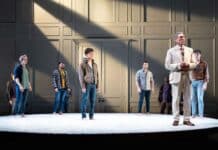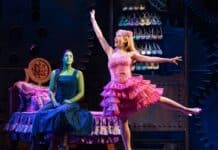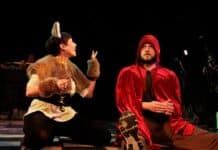Watching the Washington Stage Guild play Shaw is one of the great pleasures of DC theater. The company’s current production, Shaw’s Shorts, features three one-act plays — Interlude at the Playhouse (1907), The Dark Lady of the Sonnets (1910), and O’Flaherty V.C. (1915). The Guild encourages us to revel in the company of the mischievous, the paradoxical, the infuriating self-proclaimed genius, one George Bernard Shaw.
Interlude at the Playhouse is a sketch written for the 1907 opening of the renovated Playhouse Theatre, near the banks of the Thames. Two years earlier, in a construction accident, the roof of the Charing Cross railway station next door collapsed on it, and several workers were killed. The evening was a tribute to the “plucky perseverance” of all who triumphed over the disaster and was “the clou of the evening,” according to the London Times.
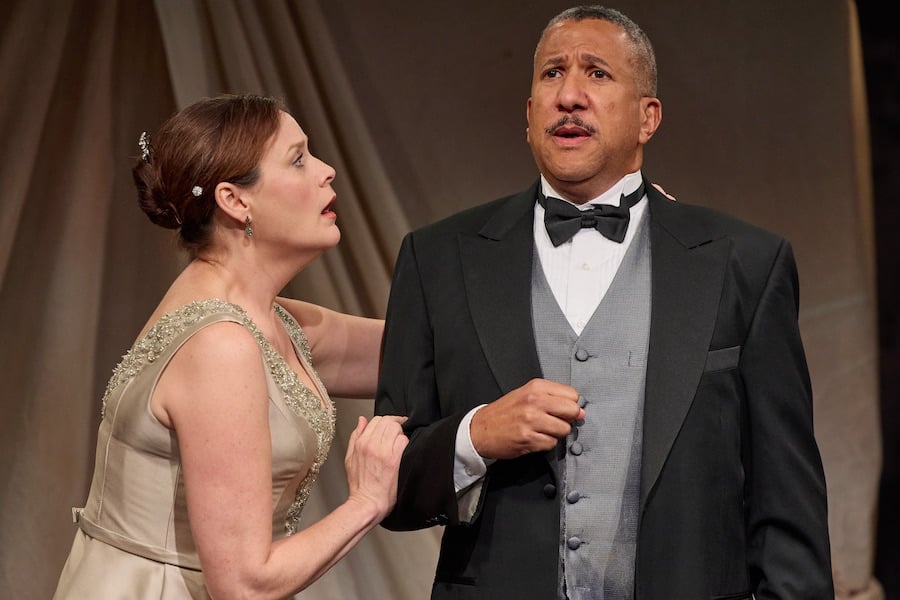
Morgan Duncan and Patricia Hurley star as the Manager, Edwin Goldsmith, and his wife. Goldsmith, the actor-manager, who is set to make the opening speech, is hiding backstage, felled by stage fright. Hurley as the Wife (she lacks a first name) engages tenderly in the ancient art of apologizing for your husband:
THE MANAGER’S WIFE: Of course, it’s so ridiculous to be nervous like this among friends, isn’t it? But I have had such a dreadful week at home over this speech of Edwin’s. He gets so angry with me when I tell him he can’t make speeches, and nobody wants him to make one! I only wanted to encourage him, but he is so irritable when he has to build a theatre! Of course, you wouldn’t think so, seeing him act; but you don’t know what he is at home.
Hurley strikes just the right tone, a combination of terror, determination, and eagerness to please. Duncan as the “indisposed” Manager huffs and puffs his way into the action with gentlemanly gusto. This light-as-air meringue of a play sets the scene for all the misrule to follow.
The Dark Lady of the Sonnets, one of Shaw’s most well-known early one-acts, imagines a Shakespeare whose opinions of his own work and place in society correlate mysteriously with Shaw’s. Thomas Daniels’ Shakespeare (he is called The Man) is, like Shaw, intellectually vain and susceptible to love affairs. He is an indiscreet boyfriend (which we knew) and a bit of a cad (which we suspected). His tryst with the Dark Lady (Leah Packer) is interrupted by an encounter with another Elizabethan legend (Patricia Hurley). Hurley (she is called The Lady) quotes the Scottish politician Andrew Fletcher (1655-1716) (slightly paraphrased): “[T]he Scottish minstrel hath well said that ‘he that maketh the songs of a nation is mightier than he that maketh its laws; and the same may well be true of plays and interludes.’”
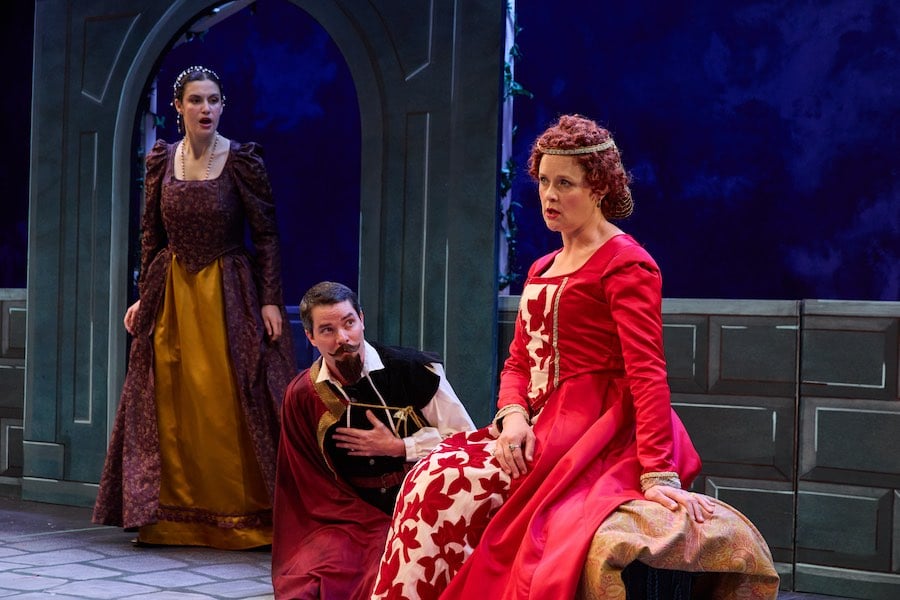
Havoc ensues when the Dark Lady arrives — there are many candidates for this unknown beloved of Shakespeare’s, whose eyes, in Sonnet 130, are famously said to be “nothing like the sun.” Here, she is the now considered unlikely Mary Fitton (1578-1647), a maid of honor to the Queen. A furious scene follows:
THE LADY: Unmeasured impudence! On your life, take your hands from me.
THE DARK LADY comes stooping along the terrace….When she sees how they are employed, she rises angrily to her full height, and listens jealously.
THE MAN: [unaware of the Dark Lady] Then cease to make my hands tremble with the streams of life you pour through them. You hold me as the lodestar holds the iron; I cannot but cling to you. We are lost, you and I, nothing can separate us now.
THE DARK LADY: We shall see that, false lying hound, you and your filthy trull.
Hurley as The Lady is high-strung, eloquent, and keenly aware of her own stature. Leah Packer as The Dark Lady has an unusual depth of feeling. Both performances are excellent, as is Daniels’ Shakespeare. Although in this scene he comes across about as well as a man caught between two women usually does.
O’Flaherty V.C. is one of Shaw’s finest one-acts, written in the shadow of World War I. Thomas Daniels is Dennis O’Flaherty, a private who has won the Victoria Cross for bravery but remains bitter about the cruelty and pointlessness of war. He has been recruiting Irish soldiers and is back on the estate of local baronet General Pearce Madigan (Morgan Duncan), who, though well-meaning, is a rare combination of stateliness and ignorance. O’Flaherty spends the early part of the play dreading the arrival of his mother (Patricia Hurley). Mrs. O’Flaherty, like many Irish of the time, is a republican, less than happy about fighting for king and country. Consequently, O’Flaherty has given her the impression that he has been fighting for the Germans. Shaw calls her “a Volumnia of the potato patch.” O’Flaherty describes her thus:
O’FLAHERTY: She says all the English generals is Irish. She says all the English poets and great men was Irish. She says the English never knew how to read their own books until we taught them. She says we’re the lost tribes of Israel and the chosen people of God. She says that the goddess Venus, that was born out of the foam of the sea, came up out of the water in Killiney Bay off Bray Head. She says that Moses built the seven churches, and that Lazarus was buried in Glasnevin.
SIR PEARCE: Bosh! How does she know he was? Did you ever ask her?
O’FLAHERTY: I did, sir, often.
SIR PEARCE: And what did she say?
O’FLAHERTY: She asked me how did I know he wasn’t, and fetched me a clout on the side of my head.
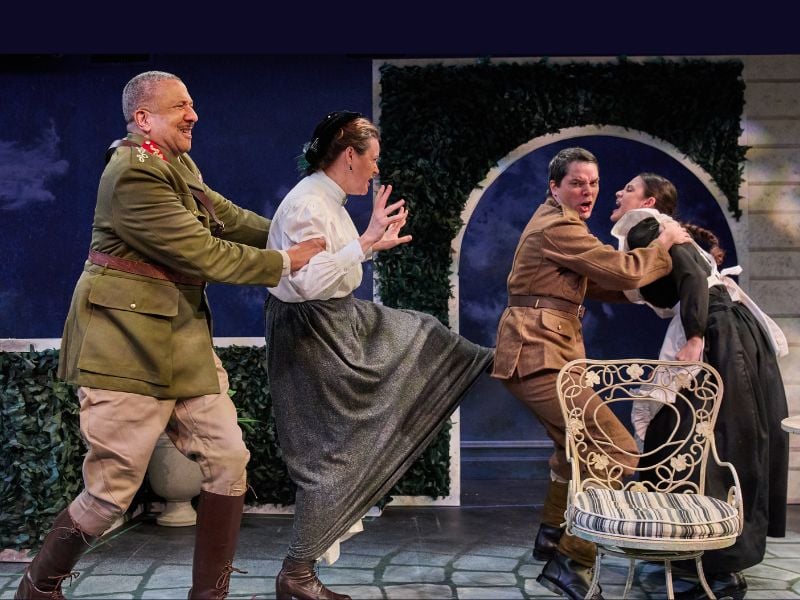
When Mrs. O’Flaherty enters, a glorious donnybrook ensues, involving all three, with the addition of O’Flaherty’s mercenary colleen, Teresa Driscoll (Leah Packer). The actors, along with Fight/Intimacy Choreographer Bess Kaye, make a hilarious climax of this scene, which is the funniest of them all.
Director Laura Giannarelli’s deep understanding of the text and the versatility of her actors shine throughout. Costumes (Emily Vallozzi) are appropriate and stylish, from Mrs. Goldsmith’s gown to Edwin Goldsmith’s evening attire to Teresa Driscoll’s maid’s uniform. Scenery (Jonathan Dahm Robertson) is perfectly suited to the needs of the production, as is lighting by Marianne Meadows and sound by David Bryan Jackson.
Despite his controversial views on certain subjects, such as his belief in eugenics, Shaw remains a seminal playwright. He is the only person to have received both the Nobel Prize for Literature (1925) and an Oscar (1939) for his work on Pygmalion, which later became the musical My Fair Lady (1956). This production reminds us why.
Running Time: One hour and 45 minutes, with one 15-minute intermission.
Shaw’s Shorts plays through December 15, 2024, presented by Washington Stage Guild performing at The Undercroft Theatre at Mount Vernon Place United Methodist Church, 900 Massachusetts Avenue NW, Washington, DC. Prices are $50 for Thursday evening performances and Saturday and Sunday matinees, and $60 for Saturday evenings. Students are half-price, and seniors over 65 get a $10 discount. Tickets can be purchased online.
Cast and creative credits are here.
COVID Safety: Masks are recommended (not required). Washington Stage Guild’s complete Health and Safety Policy is here.
Shaw’s Shorts by George Bernard Shaw
Directed by Laura Giannarelli
Artistic Director: Bill Largess
Associate Artistic Director: Steven Carpenter
CAST
Interlude at the Playhouse
Mrs. Goldsmith, the Manager’s wife: Patricia Hurley
Edwin Goldsmith, the Manager: Morgan Duncan
Stage Manager: Leah Packer
The Dark Lady of the Sonnets
The Beefeater: Morgan Duncan
The Man: Thomas Daniels
The Lady: Patricia Hurley
The Dark Lady: Leah Packer
O’Flaherty V.C.
Dennis O’Flaherty, Irish soldier: Thomas Daniels
General Sir Pearce Madigan: Morgan Duncan
Mrs. O’Flaherty : Patricia Hurley
Teresa Driscoll: Leah Packer
CREATIVE AND PRODUCTION TEAM
Scenic Designer : Jonathan Dahm Robertson
Costume Designer: Emily Vallozzi
Lighting Designer: Marianne Meadows
Sound Designer: David Bryan Jackson
Stage Manager: Libby Anne Russler
Assistant Stage Manager: Luca Maggs
Fight/Intimacy Choreographer: Bess Kaye
Dramaturg: Bill Largess

